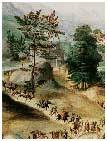FRANCESCO DI MARCO DATINI/2
18 Kb.



Over the years following, he appeared as a partner (and with
an already significant capital) in two other Florentine companies:
first that of the Florentine, Tuccio di Lambertuccio, and then
that of another Florentine, the Toro of Berto di Tieri (two other
companies with offices one in Florence and the other in Avignon
belonged to him).
In 1373, Francesco appeared as the head of a firm.
In 1373, Francesco appeared as the head of a firm.
62 Kb.

After Rome was re-appointed as the Holy See in 1378, Avignon
began to cede some of its importance to other commercial centres.
Datini had meanwhile accummulated considerable possessions and prepared to return to his country of birth.
Towards the end of 1382, he entrusted the recently-formed company at Avignon to the stewards Boninsegna di Matteo and Tieri di Benci, raising them to the position of managing partners, and, after a journey lasting 33 days (the entire description and the accounting documentation of which still remains), he returned to Prato.
Datini had meanwhile accummulated considerable possessions and prepared to return to his country of birth.
Towards the end of 1382, he entrusted the recently-formed company at Avignon to the stewards Boninsegna di Matteo and Tieri di Benci, raising them to the position of managing partners, and, after a journey lasting 33 days (the entire description and the accounting documentation of which still remains), he returned to Prato.
94 Kb.



On his re-entry into the city, he was preceded by his fame as
a wealthy, respectable man, as borne out by the acquaintances
acquired in Avignon and the friendships he soon struck up in
Florence and Prato. Among the latter was the very illustrious
one with Lapo Mazzei (the ample correspondence of which, published
by Guasti, still remains) and that with Guido del Palagio and
with the principal Florentine families, the Medici, the Tornabuoni,
the Pazzi, the Guicciardini, the Alberti and the Paciti' with
whom he was linked by tight personal and business bonds.
49 Kb.

On consideration of his wealth, the Comune of Prato immediately
offered Farnceso the position of councillor and, later, that
of gonfalonier of justice which he actually only accepted because
he felt obliged to. In truth, he did not enjoy public office
which hindered him from looking after his affairs. This comment
about his experience as gonfalonier was significant: "infine,
acetai e feci l'uficio: e, per non perdere tempo, chome usciva
d'uficio, io faceva murare dì e notte, per acon(c)iarmi
in chasa: ed eravi tanto diligiente, che sempre cenava alla mezanotte;
e chi m'avesse voluto dare danari, io no' lgli arei tolti."
207 Kb.

The Prato home-coming coincided with a marked, concrete development
in his business, supported by the creation of merchant companies
distributed in some of the main trade centres of the time and
linked up among themselves in what has been defined as company system. Within a short time, the company at Avignon was flanked by three company nuclei: the one at Pisa (the accounting records of which were opened in January 1383) and soon afterwards those in Florence and Prato.